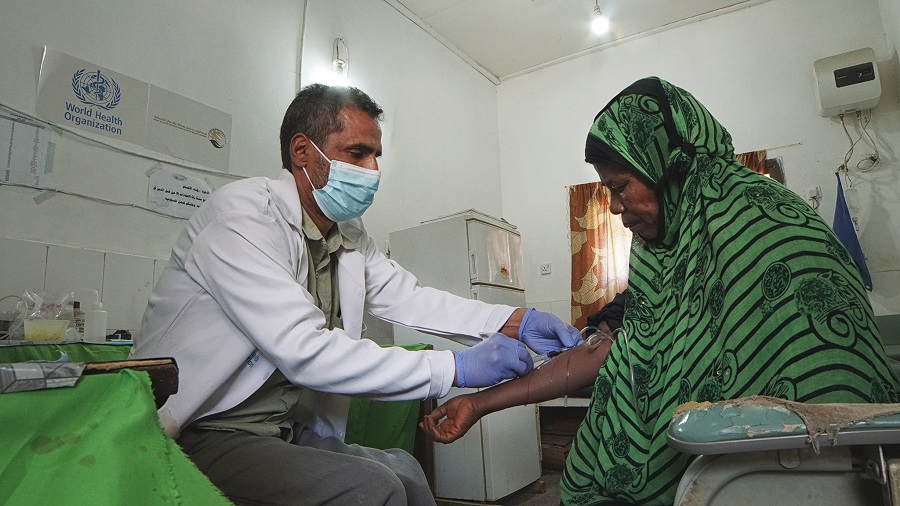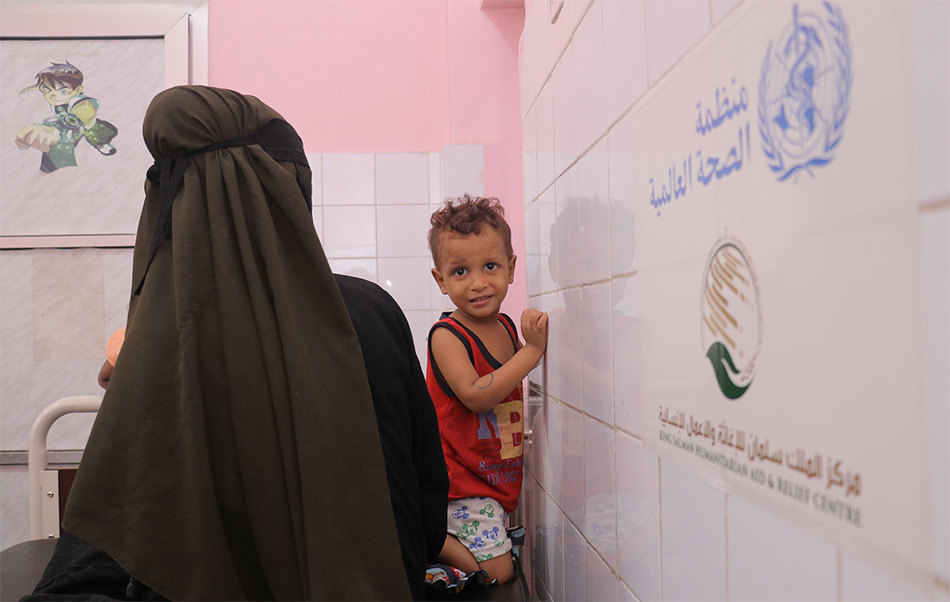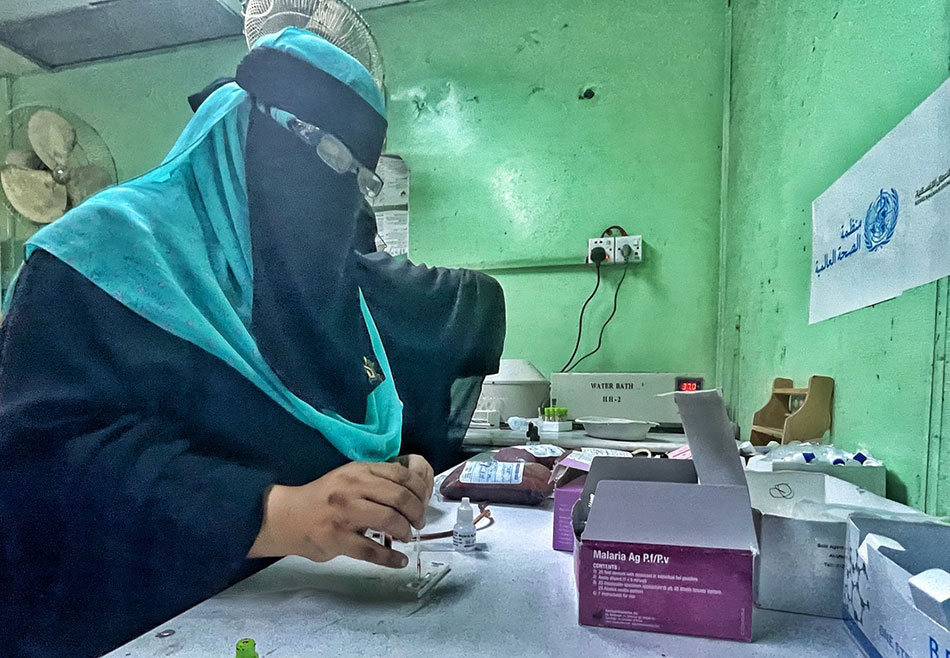Essential Health Services Project, supported by the King Salman Humanitarian Aid and Relief Centre, is a lifeline for millions across Yemen

5 December 2021 – The conflict in Yemen has taken a dreadful toll on the health infrastructure. Almost 7 years of active conflict has impaired the availability and quality of health services to the most vulnerable. Leaving over 20 million civilians in need of health assistance. If that is not enough, the emergence of COVID-19 has exacerbated existing pressure on health facilities and civilians who barely have access to basic health services.
WHO has led the health efforts during such difficult times along with the Health Cluster and local health authorities to mitigate the risks and strengthen the health system in one of the most complex operational environments.
In partnership with the King Salman Humanitarian Aid and Relief Centre (KSrelief), and as part of large-scale efforts to support health in Yemen, WHO leads the Essential Health Services Project – a US$ 20 500 000 project that aims to enhance Health Cluster coordination and improve access to the Minimum Service Package in vulnerable and priority districts across the country.
WHO and KSrelief, through this project, support Lawdar hospital in the Abian governorate. Dr Nabil Hussein is the Director of Lawdar hospital. He has been working at the hospital for 25 years now. “We receive 200 to 250 cases per day. Which exceeds our operational capacity,” he says.
Hundreds of people come to Lawdar hospital from surrounding districts to seek medical care, specifically surgical care as it is the only hospital that offers surgical care in the area.
“The pressure is extreme and the resources are scarce. But we ensure our best effort as much as operational capacity allows. The hospital is in dire need of more health staff and specialized health care professionals due to the pressure and the number of patients coming in. More needs to be done, and we are looking forward to continued support by WHO and KSrelief,” Dr Nabil adds.
“We are grateful for the continued dedication of WHO in such difficult circumstances. The support we received has been substantial. The hospital has been equipped with machines, medical and non-medical supplies. The efforts also included support to our therapeutic feeding centre and the COVID-19 isolation units. Not to mention the highly beneficial quality care training that was offered to health staff in the hospital,” he says.
Through the Minimum Service Package, WHO was able to provide medical supplies, medicines, laboratory supplies, oxygen supply and medical equipment to targeted health facilities. This has ensured improved access to quality health services and technologies are available for over 6 million people in need. In addition, the project ensured provision of fuel and a safe water supply to maintain functionality of health facilities and crucial delivery of health care services.
The project helps support increased access to medical care and essential health services and improved quality of health care services in 19 health facilities. Aiming to reach approximately 2.3 million people through the project activities. In addition to supporting 206 health facilities with fuel, which in turn supported access to health care for over 733 000 people. Through the Minimum Service Package, 1.2 million consultations were conducted of which 74 000 were consultations for internally displaced persons (IDPs). Through the project, computed tomography scan (CT scan) and magnetic resonance angiogram (MRA) were provided to targeted health facilities, assisting around 73 000 patients seeking medical care at these facilities each month.
The project supports the operational needs of 26 emergency operation centres across Yemen that play a pivotal role in providing real-time information, assessing the needs and the COVID-19 response, receiving alerts, as well as coordinating and managing response interventions. This helps promote integrated preparedness and response operations with 36 partners across UN and non-UN organizations.
New oxygen production stations to be constructed in Yemen
22 November 2021, Aden, Yemen - The World Health Organization (WHO) has joined efforts with the Islamic Development Bank (IsDB) Group and the Ministry of Public Health and Population to construct 14 new oxygen production stations that will save lives from the COVID-19 pandemic in Yemen.
The oxygen production stations, valued at over US$ 3.4 million, are being constructed in 11 southern governorates of Yemen and will be gradually put into operation between December 2021 and February 2022. The oxygen stations will be jointly managed and implemented by the Ministry of Public Health and Population and WHO, and are financed through a US$ 20 million loan from IsDB Group, as part of its Emergency Support for the COVID-19 Preparedness and Response Plan in Yemen. Through this support, the IsDB has also contributed to the substantial upgrading of operational capacities of 32 COVID-19 treatment centres and central public health laboratories across the country.
“The availability of uninterrupted oxygen supply is key to the survival of patients with severe cases of COVID-19 who otherwise face lung failure,” said Dr Adham Rashad Ismail Abdel Moneim, the WHO Representative in Yemen. “This is why the construction of these oxygen stations is one of the most important things we can do to save the lives of many more patients suffering from COVID-19.”
“Through this Project, the IsDB seeks to support the Republic of Yemen to overcome the humanitarian, social and economic difficulties that continue to threaten poverty alleviation efforts and disease control, particularly COVID-19,” said Dr Ilker Ersegun Kayhan, the IsDB Operations Team Leader for the Gulf Cooperation Council countries and Yemen.
“By increasing local capacity to produce medical oxygen, we can help to minimize COVID-19 morbidity and mortality rates in Yemen,” said Dr. Kayhan. “This is the first time that such a high number of plants will produce oxygen of medical grade, to support COVID-19 case management in partnership with the WHO, the Ministry of Public Health and Population, and the Ministry of Planning and International Cooperation.”
Yemen is facing urgent challenges in securing oxygen supplies that are critical to effective management of severe cases of COVID-19. The installation of 14 new oxygen production stations will strongly reinforce other efforts underway by WHO, the Ministry of Public Health and Population and IsDB to save lives and contain the spread of COVID-19 – including provision of essential medicines and supplies, personal protection equipment and other medical equipment and technologies that are critical to infection prevention and control and COVID-19 case management.
For WHO, please contact:
Sufyan Al-Mathani
WHO-Yemen Media Liaison
Mobile: +967-77001-7111
e-mail:
For IsDB Group, please contact:
MA.DinMohammadi
IsDB Group Regional Communications Officer
Mobile: +905-41228-1010
Child malnutrition and survival in war-torn Yemen

21 November 2021 - In Yemen today, over 2.25 million children under age 5 are estimated to suffer from acute malnutrition. Fortunately, thousands of these children are being nourished from the brink of death back to health – at 92 WHO-supported therapeutic feeding centers (TFCs) across Yemen.
Yemen’s fight against malaria: community volunteers make a difference

10 October 2021 - Human malaria is the most common vector-borne disease in Yemen, with approximately 65% of the total population at risk of infection. In response, WHO is supporting volunteer health workers with rapid diagnostic tests, medicines and training needed to detect and treat malaria cases, and to educate communities about malaria prevention.








